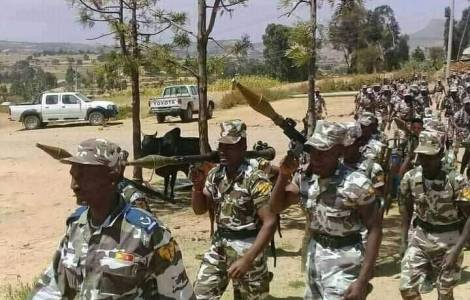
Addis Abeba (Agenzia Fides) - For days, Ethiopian federal troops have been fighting on the outskirts of Mekele, the capital of the Tigray province, against the militias of the Tigray People's Liberation Front (TPLF). Yesterday, November 26, President Abiy Ahmed ordered the offensive against the city of half a million inhabitants (see Fides, 26/11/2020).
Heavy fighting took place. Most of the fighting took place near Wukro, a city not far from the capital Tigray. The government has not yet made a breakthrough because the militias have put up heavy resistance. The risk is that the offensive will resume with force after the attack order given by the Ethiopian Prime Minister and that the Tigrayan resistance will not succeed in opposing it.
This is how Italian professor of architecture Rosa Anna Mancini, who previously taught at the University of Mekele and fled the fighting a few days ago, describes the development in the disputed region.
Rosa Anna only returned to Tigray in October to resume the courses that had been suspended as part of the measures to contain the coronavirus pandemic.. "I came back - she underlines - because the situation seemed calm. After the controversial regional elections, there were initial conflicts between federal and regional governments over political controversies with corresponding insults. But everything was limited to verbal confrontation and the local population itself did not believe a conflict would break out".
The situation worsened on November 3. There was a first clash between soldiers from Addis Ababa and the TPLF militia at Mekele airport. "It was a drop that broke the camel's back - continues Rosa Anna -. The clashes began and the life of the civilian population became more and more difficult".
The Addis Ababa Air Force started air strikes on the Tigray region. Fighter planes also dropped bombs on the outskirts of Mekele. "I myself saw military aircraft fly over the city and dropping bombs - she observes -. A really difficult situation, the targets were not only the military camps, but also the neighborhoods. A few days before I left, an aircraft was shot down by anti-aircraft. Militiamen on a motorcycle drove around with the remains to show that Ethiopian armed forces were no stronger".
All communication channels, roads, bridges, but also telephone lines, were interrupted. Money was running low and so was fuel. "There was food - explains Rosa Anna, but people were afraid that their supplies would run out, so they piled up food at home. The electricity was cut off for a while, then it resumed, but not for the entire day".
Rosa Anna was evacuated along with 200 people of foreign origin "It was not a journey, it was an odyssey - she concludes -. We had to drive through the Afar region. During the journey we witnessed a very horrible scene. Ethiopian soldiers took it out on some Tigrayans with foreign passports. If it hadn't been for the intervention of some mediators, it would probably have ended badly for them". (E.C.) (Agenzia Fides, 27/11/2020)